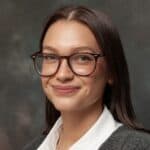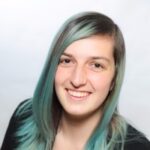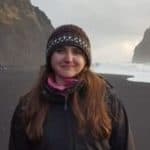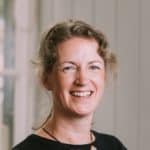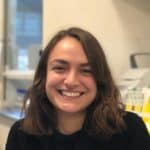Profile
Adriana Fonseca
-
About Me:
I am a biomedical researcher who lives in Cambridge. In my spare time I like participating in improvised theatre, watching comedy shows, reading and TV.
-
Read more
I am originally from Portugal, but lived in Leicester for a few years during primary school. In high school, I studied all the sciences (Biology, Geology, Physics and Chemistry), Maths, Philosophy and Portuguese. I also did a lot of acting and dancing. I moved to Glasgow for my undergraduate degree in Genetics in 2013, and have lived in the UK since! In Glasgow, I had a great time learning loads, spending time with friends, and being a tour guide at the Hunterian Museum, which has a huge collection of historic scientific objects. During my degree, I was lucky enough to do a placement year at the pharmaceutical company GlaxoSmithKline, which helped me realise how much I love research. After Glasgow, I moved to Cambridge to do my PhD. Here, I did a beginners course on improvised theatre (theatre that you make up as you go along) for scientists, and I fell in love! I helped start the Cambridge University Science Improv group, and we meet every week to play. We also regularly put on shows, where we showcase how we can add a scientific twist to classical improv formats. I also take part in science communication events, such as the yearly science festival, and am involved in charity fundraising.
-
My pronouns are:
She/her
-
My Work:
I study how methylation (a chemical mark on DNA) changes in the years leading up to a cancer diagnosis. This may help us predict risk, and detect cancer earlier, which improves survival.
-
Read more
I do a nice mix of wet lab experimental work (the classic image of a scientist – in a white coat in a lab holding tubes with different liquids) and dry lab work (data analysis using a computer – lots can be discovered this way!).
In terms of wet lab, the most common work I do is make library preparations to study methylation. DNA (the genetic material present in all our cells, which makes us who we are) is made up of four types of building blocks, known as A,T, C, and G, which are linked together in long chains. When a C is followed by a G (this is called a CpG site), the C can sometimes be methylated, which is a simple type of chemical mark. Whether or not a site is methylated has important consequences for how the DNA then behaves, which may have consequences for our health. DNA Library preparations allow us to prepare the DNA such that it the C blocks are changed if they are not methylated, but remain intact if they are methylated. The DNA is “read” using a special machine, and we can then see if each CpG was methylated or unmethylated.
I use this protocol to compare DNA from samples taken many years ago from people who were healthy, and stayed healthy for many years, to DNA from people who later went on to develop cancer, an illness resulting from abnormal cells growing out of control. Cancer cells have different methylation patterns to healthy cells, so my work allows us to see how long before diagnosis changes can arise, and how they behave through time. This will help us develop a method for deciding if a healthy person is likely to develop cancer in the next few years. If they are, we can keep a closer eye on them. This will help us diagnose a cancer early, which means it will be easier to treat. For this side of my work, I use computational approaches. My main tool is Python, a type of programming language.
-
My Typical Day:
I wake up, get ready and leave for the lab – I normally get in around 9:30am. I either do a full day of experiments in the lab, or I work in the office for the day. If it’s an office day, I analyse data on my computer, and often meet with my supervisor or other scientists in my group. I have lunch with my group as well. I usually leave around 6pm.
-
What I'd do with the prize money:
I would use the money to take a science-focused improvised theatre show to schools around the UK. This will showcase science and scientists in a new way!
-
Education:
High School – Escola Secundaria Artur Goncalves (Torres Novas, Portugal)
MSci Degree (undergraduate degree with integrated masters) – Genetics, University of Glasgow (Glasgow, UK) with placement year at GlaxoSmithKline (Stevenage, UK).
PhD – Cancer Biology, University of Cambridge (Cambridge, UK)
-
Qualifications:
High school diploma in the Sciences group (GPA 18/20)
Integrated masters (MSci) in Genetics, First class honours
PhD in Cancer Biology
-
Work History:
September 2016-August 2017: Placement student at GlaxoSmithKline (Respiratory group)
Summer 2016: Summer student, Katherine West’s lab, University of Glasgow
Summer 2015: Door to door fundraiser, Home Fundraising, Glasgow, UK
Summer 2014: Volunteer at youth centre, in Dili, Timor-Leste
-
Current Job:
Research Associate in the Blundell lab, at the Early Cancer Institute in Cambridge
-
Employer:
University of Cambridge
-
My Interview
-
How would you describe yourself in 3 words?
curiosity-driven geneticist
What did you want to be after you left school?
Scientist or psychologist
Were you ever in trouble at school?
yes - too much talking!
If you weren't doing this job, what would you choose instead?
Psychologist
Who is your favourite singer or band?
Taylor Swift
What's your favourite food?
Bacalhau com natas (traditional Portuguese dish)
If you had 3 wishes for yourself what would they be? - be honest!
to need less sleep, to be a better cook, to go on more holidays
Tell us a joke.
why did the crab get arrested? Because he kept pinching things
-

